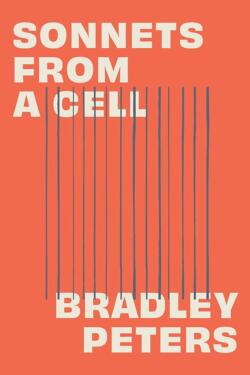Not your high school teacher’s Shakespeare
Sonnets From a Cell
by Bradley Peters
Toronto: Brick Books, 2023
$22.95 / 9781771316132
Reviewed by Harold Rhenisch
*

A cell is a lonely place. It is singular. Even when many cells are linked in series, each one is solitary. Sonnets, too.
Sonnets come from Italy, where words rhyme easily. Oddly enough, these polished little objects of love and devotion have been a favoured form of English-language poets since the 1520s.
Think of it. For five centuries, English-language poets have wrestled to fit a language that hardly rhymes at all into a form that asks for rhymes to flow across the tongue like wine. Historically, educators have loved to set students into its strait-jacket to see them try to wriggle out.
Bradley Peters gets around the self-harm of this approach by not rhyming. The words of his sonnets beat on the bars of jail cells, or on humans imprisoned in them. They are loud.
You’re going to want to get out of the assault, too, but, as Peters explains passionately, first you have to accept the imprisonment. Peters does, but the tattooing, the scarring, remains, as the sonnet sequences that make up this book. It is, he writes in “A Visit to the Box,” “a room the shape of my own face.”
After a year of incarceration, Peters now works as an actor and carpenter in a town near Chilliwack. In other words, he helps words come to life and builds cells for people to live and work in. Sonnets, all the way.
Sonnets are far from simple. A steady rhythm gives a tone of intimate talk. Linked rhymes create meaning that you can’t always quite put your finger on. Environmental rigidity forces readers to see with the eyes of the form, rather than the eyes of modern individual life. In other words, with a sonnet’s grab bag of contrasting effects, you can get out of your own head, or your own cell.
Every sonnet threatens to be a surprise. The journey through a sonnet’s fourteen lines have pushed poets in many directions over the years. The man who introduced the form to England, Sir Thomas Wyatt, wrote political love sonnets. Peters does that.
Shakespeare went in a different direction. He wrote enigmatic love sonnets about the flexibility and secrecy of identity in the 1600s. Peters does that, too, like this in “Like Home”:
Your honour. My cavity is spotless.
I am strip-searched via video court.
I’ll exalt the brickwork. I’ll serve dead air
shaken down and measured to a whimper.
John Donne wrote his Holy Sonnets, known best for his musings on the inescapability of death—“One short sleep past, we wake eternally And death shall be no more; Death, thou shalt die.” Peters revels in such irony and wordplay. It’s just that his God is not a deity but a warden and a buzzer in a cell block.
Christina Rossetti and Edna St. Vincent Millay came up with a different solution. They wrote tender lyrics in the early Renaissance Italian style. That works, too. Peters isn’t so comfortable with his world, though, so prefers the brasher style of the Americans John Berryman and Terrance Hayes: Berryman for the drunken brawling and hallucinogenic haze of his brilliant word connections; Hayes for his pointed social engagement.

In Sonnets from a Cell, doors clang. Chains rattle. The lines of the poems are bars. In the cells, one lives either in solitary, going mad, or with a cellmate, living in distrust because the cell already owns you. Inmates look out through the bars. The bars are like teeth. There are toothbrushes. Often the toothbrushes are filed down into shivs. When they are thrust through ribs, other bars around the heart, people die. It’s just a matter of time, or, as Peters writes in “Fish,” “The dead man’s dead / he just doesn’t know it yet.”
People look in, too. Sometimes they are guards. Sometimes they are other prisoners. Sometimes it is us. But when it’s us, Peters owns us. If we look in, we look in with his eyes looking out. Even if we look in with the eyes of a guard, it’s a guard he has made for us, one with Peters’ own eyes. It’s a fitting technique for a sequence talking about the paranoia that comes from isolation.
“Red birds, staring out, plucking themselves bald,” Peters writes in “Red Birds,” after the sobering preface that describes how the longer a sentence one serves, the less one is viewed as being human.
What ties one cell to another—and to the world—in Peters’ cell block of sonnets is a series of mechanical manipulations. Each poem is a postcard sent out from a place where you must fight and you must engage. You cannot use the cell as protection. In other words, a sonnet.
Each of these cells is coloured by a title. Accept that, and you have to accept everything that follows. It is not a democratic space.
Each of the titles is coloured by an epigraph, quotes from inmates about the experience of being jailed, quotes from mental health experts, or quotes from poetry that relates to the prisoner experience. They are a bit random, but by being chosen and nailed above the cell, they become deeply significant. It’s just that the significance is mysterious, even when obvious. A perfect riposte to the sonnet’s demands.
In “Indigo,” for example, Peters starts with a biblical quotation, “at the roots of the mountains, I went down to the land whose bars closed on me forever” (Jonah 2:6), ends with isolation, like Christ:
Here I am Splayed on my bunk. Part cage, part comfort zone. Grind me mindless with mechanical teeth. Take me down, take me where I know the way. The way, revealed in the next sonnet, is memory.
Memory is also one of the book’s chains. There are a lot of those. They rattle. They clank. They pull. They surprise. In one of Peters’ patterns, the last line of one sonnet is identical to the first line of the next. As a result, each sonnet ends in being locked down and defeated. Then there is silence. Then, out of the silence, the chains are broken free, the line is repeated in hope, and another breakout is imagined, from inside the cell. Then it too is locked down and defeated. Peters might be free inside it, but he has to do his time.
Another sequence portrays Peters learning to embrace violence as the only safety, to never stand down, because to attempt to live a private life is to not be present, and you have to be present in a sonnet, and a cell.
Shakespeare knew it when he created sonnets to preserve the youth of his lovers, so they could be born fully formed in his readers. For as long a people read books they would live—not exactly forever, but even so they cheated death, a little.
Peters’ own intimate sequence is not a line of cells with inmates or guards banging against the bars (as the other sequences are), but a chain itself, without beginning or end. Its links are images and bodily experiences. Like Shakespeare’s lover, who remains youthful and eternal in his captivity within the sonnets, it is here, where Peters is not fighting, that he is more intimately alive. He is inside. Waiting. Doing his time. By submitting, as in “Getting Netted Up,” he gets out:
The cage lights want to chat, but I’m dead tired!
They smile, lean down, hum softly, and thumb my cheek.
This is not Shakespeare. Shakespeare’s form was musical, in the sense of a madrigal strummed on a lute. Peters sonnets are musical, too, but more in the sense of Punk Rock, raucous and percussive grunge music, and Pink Floyd’s “Wish You Were Here.” Welcome to the Machine.
As the band sang in “Dark Side of the Moon” before that, “Don’t give me any more of that do goody good bullshit.”
There’s not a hint of it here, just the assault of a prison’s noise, and the triumph of human life walking out of it one day to shape it into song.
*

Harold Rhenisch has written some thirty books from the Southern Interior since 1974. He won the George Ryga Prize for The Wolves at Evelyn (Brindle & Glass, 2006), a memoir of German immigrant life from the Similkameen to the Bulkley valleys. His other grasslands books are Tom Thompson’s Shack (New Star, 1999) and Out of the Interior (Ronsdale, 1993). He lived for fifteen years in the South Cariboo and has worked closely with the photographer Chris Harris on Spirit in the Grass (2008), Motherstone (2010), and Cariboo Chilcotin Coast (2016), as well as on The Bowron Lakes (2006), all published by Country Lights; and he writes the blog Okanagan-Okanogan. He is working on Commonage, a history of the Okanagan region, highlighting the American history of Father Charles Pandosy and situating the roots of the Commonage land claim in the North Okanagan in American colonial practice in Old Oregon. [Editor’s note: Harold Rhenisch has reviewed books by Aaron Tucker, Dale Tracy, Dominique Bernier-Cormier, Selina Boan, Joseph Dandurand, Délani Valin, Robert Bringhurst, Rayya Liebich, Sarah de Leeuw, Roger Farr, Stephan Torre, Don Gayton, and Calvin White for BCR. His book Landings (Burton House, 2021) was reviewed by Luanne Armstrong; The Tree Whisperer (Gaspereau, 2021) was reviewed by Adrienne Fitzpatrick. Harold lives in Vernon.]
*
The British Columbia Review
Interim Editors, 2023-24: Trevor Marc Hughes (non-fiction), Brett Josef Grubisic (fiction)
Publisher: Richard Mackie
Formerly The Ormsby Review, The British Columbia Review is an on-line book review and journal service for BC writers and readers. The Advisory Board now consists of Jean Barman, Wade Davis, Robin Fisher, Barry Gough, Hugh Johnston, Kathy Mezei, Patricia Roy, Maria Tippett, and Graeme Wynn. Provincial Government Patron (since September 2018): Creative BC. Honorary Patron: Yosef Wosk. Scholarly Patron: SFU Graduate Liberal Studies. The British Columbia Review was founded in 2016 by Richard Mackie and Alan Twigg.
“Only connect.” – E.M. Forster































8 comments on “Not your high school teacher’s Shakespeare”